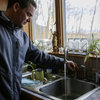Three municipalities hope to capitalize on water and infrastructure grants
ALBANY COUNTY — Faced with different challenges in their water systems, at least three municipalities in the Enterprise coverage area — Voorheesville, Westerlo, and Rensselaerville — are currently gunning for public money that will allow them to address the problems with as little impact on taxpayers as possible.
More funding than previously is now available through the state and federal governments for water projects, due to the Bipartisan Infrastructure Law, which has injected $50 billion of federal money into water projects, and the state’s Environmental Bond Act, which added to the $500 million in clean-water funding in New York state’s budget.
This funding is meant to correct what many view as inattention to the country’s aging water systems. According to Pew, a nonpartisan research center and think tank based in Washington, D.C., America’s water infrastructure has received a D or D- rating from the American Society of Civil Engineers for more than a decade.
Federal and state drinking water standards are being raised as research uncovers the dangers of various chemicals in drinking water. This puts the onus on water-system owners to adapt their systems to the new requirements, at great cost; many municipal systems were built in the 1970s and ’80s, according to McKinsey, a global management consulting firm that advises governments as well as corporations.
McKinsey expects that new guidelines for PFAs, per- and polyfluoroalkyl substances, for instance, will triple the treatment costs for that family of chemicals by 2025.
The widely-used chemicals are often called “forever chemicals” because their components break down so slowly over time; many PFAS are found in the blood of people and animals all over the world and are present at low levels in a variety of food products and in the environment, according to the federal Environmental Protection Agency.
Voorheesville
The village of Voorheesville has recently authorized Mayor Richard Straut to submit applications for the state’s Water Infrastructure Improvement Act and Water Quality Improvement Act grants to help the village fund repairs to pipes and manholes, and to fund a system that disinfects treated water coming out of the wastewater treatment plant with ultraviolet light.
Straut told The Enterprise this week that the sewer-system repairs are meant to help the village manage stormwater infiltration and inflow. Infiltration refers to stormwater seeping into the system through faulty connections or deteriorated pipes, while inflow refers to water entering through larger openings such as manhole covers.
Stormwater “encumbers capacity of the plant that should be available for treatment of sanitary sewage,” Straut said. “As the sewer system ages this issue will continue to worsen so we must work on fixing the highest priority leakage areas.”
Stormwater runoff has become more common in the United States as development in communities has increased the number of impervious surfaces, as The Enterprise reported in an editorial last month on the effects of stormwater on the environment, also noting the increase in rainfall as climate change creates more humid conditions in this region.
Westerlo
Westerlo, meanwhile, is hoping to come up with $300,000 to $400,000 to address bromomethane in its water.
The carcinogenic pesticide has been in the town’s water ever since it created its groundwater-based system in 2005, as The Enterprise has previously reported, but exceeded the standard in 2018, setting off an earlier effort to fund a filtration system. However, it is believed public health has not been endangered.
At the time, it was projected to cost up to $200,000, but the town struggled to find a source of funding.
Part of the problem, which continues today, is that the town is considered above the median income level to be eligible for certain grants. One option the board discussed is lobbying Albany County with the help of state representatives to include the water district improvements in the county budget.
A meeting between town officials and Assemblyman Chris Tague, and a representative from Senator Neil Breslin’s office, was scheduled in July to go over funding. Last month, Lisa DeGroff, who is a confidential administrator for Westerlo and also chairs Westerlo’s Republican committee, said she expects to continue meeting with Tague, who at one time was in charge of Schoharie County’s water and sewer systems.
Westerlo Supervisor Matthew Kryzak also said last month that he is continuing to investigate grant opportunities.
Rensselaerville
In Rensselaerville, the problem is with the disinfection byproducts TTHMs (total trihalomethanes) and HAA5, which is a group of five haloacetic acids: dibromoacetic acid, dichloroacetic acid, monobromoacetic acid, monochloroacetic acid, and trichloroacetic acid.
The town’s system uses surface water from Lake Myosotis, which is more exposed to general contaminants than water sourced from a more restricted area, like an aquifer.
Unlike Voorheesville, Rensselaerville benefitted from the greater rainfall this year compared to last. Rensselaerville Water and Sewer Advisory Committee Chairman Ed Csukas told The Enterprise that the dryness last year led to brown water coming out of his faucet because the aging municipal system can’t effectively treat discoloration.
Like Westerlo’s, the water is considered safe, but officials are aware of the need to address the problem and get levels consistently in line with state and federal regulations.
“Really, what we’re looking at right now is, if we don’t take advantage of the funding that’s currently available and it goes away, a small town like ours will never be able to afford an upgrade,” Csukas told The Enterprise last month.


